This is the newsletter version of Sara by the Season, where I explore what is piquing my curiosity as I try to lean into nature’s wisdom and rhythms. You can listen to me read you the newsletter by hitting play above - or you can click the little link above and to the right to play in your favorite podcast player. Please excuse my voice in this week’s recording - I’m recovering from a cold, and I didn’t realize how rough I sounded until I was already halfway through!
If you know someone who would like this sort of thing, I’d be so grateful if you would share it.
Last year, around this time, I wrote about the Jewish practice of Elul:
Elul is the last month of the Hebrew calendar and an entire month set aside for reflection. According to Hebrew tradition, Elul is a time for cheshbon hanefesh — literally “an accounting of the soul” - prior to the start of the new year. Rabbi David Wolpe writes, “Elul calls us to be deep sea divers into our soul…Only by apprehending who we are can we shape real hopes about who we might become.”
As I wrote last year, I think of February, particularly, as reflection season. I wrote, “I like to go into my new year (which I think of as the spring equinox) with a clearer picture of what I want and need more of and what things are no longer serving me that I can let go of or eliminate if at all possible.”
I love this Jewish idea of reflecting in community, but it’s hard to ask people to do this work. We need a container to hold us safely, and we need someone else to go first. Religious communities can be good at this, when done well, with the intention of finding the better way forward together, without shame and too many shoulds. Recovery programs seem to do this well. But not all of us are in recovery (even if we all should be). Furthermore, most of us Americans don’t identify as religious anymore, and based on the amount of people who do identify as religious who polls show are planning to vote for Donald Trump again this year, I’m not confident those that do identify as religious are doing much reflection work anyway.
We Americans generally don’t seem to be very good at reflection (Exhibit A: the banning of teaching actual history in public schools in states across the country), and we’re missing out on so much by actively avoiding this difficult - and yet so rewarding! - work. We have to look backwards to see where we’re missing the mark, where we’ve grown out of alignment with our values, where we are doing well, what we want more of. John Dewey, the renowned learning researcher, said that, “we do not learn from experience…we learn from reflecting on experience,” which means we can’t really learn anything without the integral step of looking back and reflecting.
The myth of progress keeps us constantly looking forward, assuming that progress, like time, marches forward relentlessly. But progress doesn’t always bring us forward, despite what the techno-bros try to sell us, and the more we learn about time, the less linear it looks. In this fascinating conversation, Paul Kingsnorth says:
Probably the central story of our culture—which I think has replaced a lot of the religious stories that used to be at the heart of our culture—is the story of progress…[The story of progress] sees an endless series of steps, every one of which improves things in the material sense from the one before. I don’t think it’s historically true. Actually, what happens is that things tend to rise and fall in cycles. But it has an enormously powerful grip on us, and it informs everything from our view of the past, which we increasingly believe was a savage place in which our lack of technology and science drove us to a sort of misery and poverty, to our view of the future, in which we assume that more technology and more scientific focus and more centralization will take us to a kind of paradise.
And so we have this story that we believe in which everything continues to get better every generation, and our job is to keep that process going. I think once you believe that, then you are stuck in a very linear narrative. You are unable to see, you are unable to learn much from the past on your own, and you are probably unable to learn much from the mistakes of the present as well.
Because we’ve been unwilling to look backward both collectively and individually, we have sleep-walked our way into this place in which many of us are on some merry-go-round that we feel like we didn’t sign up for, but also can’t figure out how to jump off either.
In the Christian tradition, the season of Lent began this week. If we look at all of our great spiritual traditions, nearly all of them that we can find record of ritualize some form of fasting and reflection. I find it interesting that they so often pair the two practices, as if reminding us that it is necessary to do less, to minimize, to declutter our lives in order to properly look back. A cursory overview of spiritual traditions finds the following examples:
In most indigenous cultures, fasting was used to prepare for rituals, as integral parts of their rites of passage, and as part of a cycle of self- and communal reflection.
Christians have been practicing Lent since the second century for the 40 days prior to Easter. Lent is a time of self-reflection and preparation before the holy season of Easter.
Muslims practice Ramadan, their annual month of fasting and reflection.
In Judaism, they have many fasting days, and there is the entire month of Elul set aside for reflection before the arrival of the Jewish new year.
The Baháʼí Faith observes fasting and “spiritual recuperation” during their month of ʻAlaʼ (March 1 - March 20ish).
Many Hindus observe fasting twice a month on what they call Ekadashi, which is the eleventh day of each moon cycle. They believe according to their Vedic lunar calendar, that there are two days a month that are particularly suited for self-reflection and the clarity that often comes with fasting.
Buddhists have different traditions around fasting depending on the sect, but the first of the seven factors of awakening in Buddhism is sati, which is often translated as mindfulness, but really might better be translated as “remembering to observe,” a helpful directive for any reflection season.
It is no wonder that so many of our great wisdom traditions have incorporated elements of fasting and reflection into the cycle of their practices, both communally and individually. We are a culture and people desperately in need of an accounting of our souls. Perhaps we don’t have safe containers of community calling us to do this work like so many of our ancestors did (and that alone is worth grieving and contemplating), but we can look to the cycles of nature. I believe nature supports us in the good, hard work of reflecting, and I feel its support for looking back, checking in, and assessing where I am most in the winter season, especially these days as the spring energy just barely begins to return.
Maybe you could lean into the invitation of reflection season too before the rush of spring’s energy to come. Here are some things I found that might help:
What we know about learning. There is actually a ton of science around how important reflection is to the learning process. Check out these resources that delve more deeply into the research and how best to use it for further study:
This summary on reflective learning and reflective practice - and their differences
Steal this worksheet of reflection questions to use in therapy for a little DIY therapy this month
Motivation for reflection. Sometimes reflection can be daunting, and we need a little nudge like the following to get going.
This lovely reflection from Maria Popova at The Marginalian on John Dewey
So much of good reflection and learning (and conversation and LIFE) if you ask me is asking good questions in the first place. Here are some great ones to get you started.
Here’s to reflecting in the season ahead,
Sara


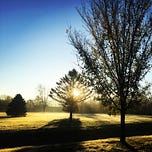



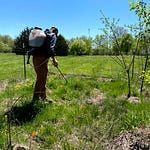
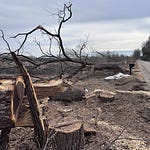



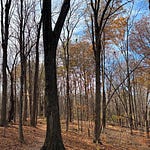

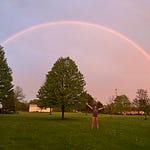
Share this post